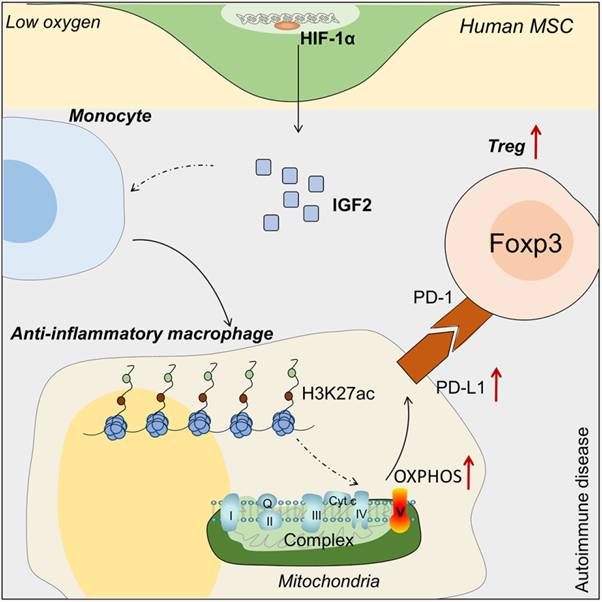

Highlights
Mesenchymal stem cells (MSCs) are almost ubiquitous in the human body. They are among the most studied tissue stem cells because they are easily accessible and can be expanded in culture dishes. Importantly, MSCs, owing to their strong abilities to regulate immune responses, hold a great promise for the treatment of various immune disorders.
Previous studies have demonstrated that the immunoregulatory properties of MSCs are not intrinsic (Cell Stem Cell. 2008; 2:141-150), rather tightly regulated by local tissue environment (Nature Immunology. 2014; 15:1009-1016). MSCs in general are thought to enable damaged tissues to form a balanced inflammatory and regenerative microenvironment in the presence of vigorous inflammation. However, understanding of how MSCs regulate tissue microenvironment and thereby exert therapeutic effects is very limited.
The latest work directed by Prof. SHI Yufang & Prof. WANG Ying published online on Feb. 7th, 2019 in Cell Metabolism adds exciting new information to this fast evolving field. The research findings entitled “IGF-2 Preprograms Maturing Macrophages to Acquire Oxidative Phosphorylation-Dependent Anti-inflammatory Properties” (DOI: 10.1016/j.cmet.2019.01.006) demonstrate that a low oxygen culture condition could enhance the therapeutic effects of MSCs on autoimmune diseases by up-regulating the secretion of insulin like growth factor-2 (IGF-2). The role of IGF-2 was demonstrated by genetic knockdown, specific antibody neutralization and direct administration of IGF-2 in experimental autoimmune encephalomyelitis, a mouse model of multiple sclerosis. IGF-2 was found to induce a population of PD-L1high macrophages, which in turn promote the differentiation of immunosuppressive Tregs. This effect of IGF-2 was found to be exerted through metabolically preprogramming maturing macrophages to commit oxidative phosphorylation (OXPHOS). Blockade of OXPHOS by oligomycin could diminish the therapeutic effect of IGF-2.
This study thus reveals a hitherto unappreciated mechanism of MSC-mediated therapy and provides a novel strategy for targeting macrophages in managing autoimmune disorders.

Link to Paper:https://www.sciencedirect.com/science/article/abs/pii/S1550413119300063?via%3Dihub